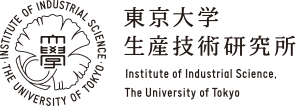
On behalf of the IIS members, I would like to express my gratitude to the supporters of our institute. In addition to my initial policy statements published elsewhere in the IIS News, volume 201 (in Japanese), I would like to take this opportunity to address the virtues and the profile of IIS.
IIS has approximately 120 faculty members, including Lecturers, Associate Professor and Professors. We also host Visiting Faculty Members and Project Researchers, making up a total number of 150 principal investigators. Perhaps this number reminds you of the famous concept of Dunbar’s number*1, which happens to be the number of principal investigators of IIS; in plain words, it is a scale of groups where every face can be identified. No matter where you are in the IIS buildings of massive size with two parallel wings of seven or eight floors, spanning 200 meters each, such a number of members allows us to retain episodic memories about you, thereby creating a sense of unity as an organization.
Supported by almost 160 staff members, these principal investigators conduct a wide spectrum of research activities in the field of engineering in collaboration with approximately 200 internal researchers and 800 seconded ones, and also provide advice to 900 graduate students. Despite the large total number of more than 2,200 people, making it one of the largest university-affiliated research institutes in Japan, its activities can be viewed as an ensemble of elements of no greater than the Dunbar’s number; this size is beneficial for us to flexibly organize cross-disciplinary research centers exploring new fields in an ad hoc manner. It also allows us to build teams with diverse skills from all technology layers including materials, processes, devices, systems, communications, services, and applications in a self-assembling manner. Flexibility is the perfect word for IIS, which is a modern incarnation of Centuria consisting of 150 specialists.
During the Japanese period of high economic growth in the Showa era, IIS contributed to the national development through comprehensive engineering in collaboration with industry. For example, take a look at rocket science, blast furnaces for steel refining, and torque converters for vehicles featured in the Seiken Chronicle. Later, in the Heisei era, IIS promoted the Japan’s presence in the world through international collaboration in the fields of global environment, disaster prevention, micromechatronics, and nanobiochemistry. Now in the Reiwa era, we are conducting value creation studies through scientific initiatives for complex systems, big data analysis, culture & engineering activities, and DLX design.
These new initiatives are understood as a shift from the traditional science of things to that of human experience. While the conventional engineering was designed for the evolution and development of civilization through the provision of universally applicable technologies, thereby increasing the economic power of the nation, the engineering reborn with IIS is directed to make contribution to the cultivation and refinement of culture through the creation of irreplaceable values, thereby placing the raison d'être of engineering in the pursuit of what money cannot buy, which is the supreme good or so-called human well-being.
It is getting more difficult to find the bright side of academia, in light of recent situations surrounding universities and research institutes suffering from the funding cut, the gradual decrease in the number of students due to the low birthrate, and the reduction of productivity due to the compromised quality of research time. Nonetheless, isn’t it worth acknowledging the group of researchers, standing tall with lofty ideal and dedicating their lives to the development of philosophy?
As the head of IIS, it is time for me to make every commitment to make the presence of IIS appreciated like never before.
Professor Hiroshi Toshiyoshi, Director General
*1 Dunbar’s number is the cognitive upper limit for people in a group that can maintain good social relationships. The number was presented by anthropologist R. Dunbar, who discovered a correlation between primate brain size and the number of individuals in a cohort.
